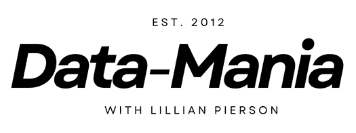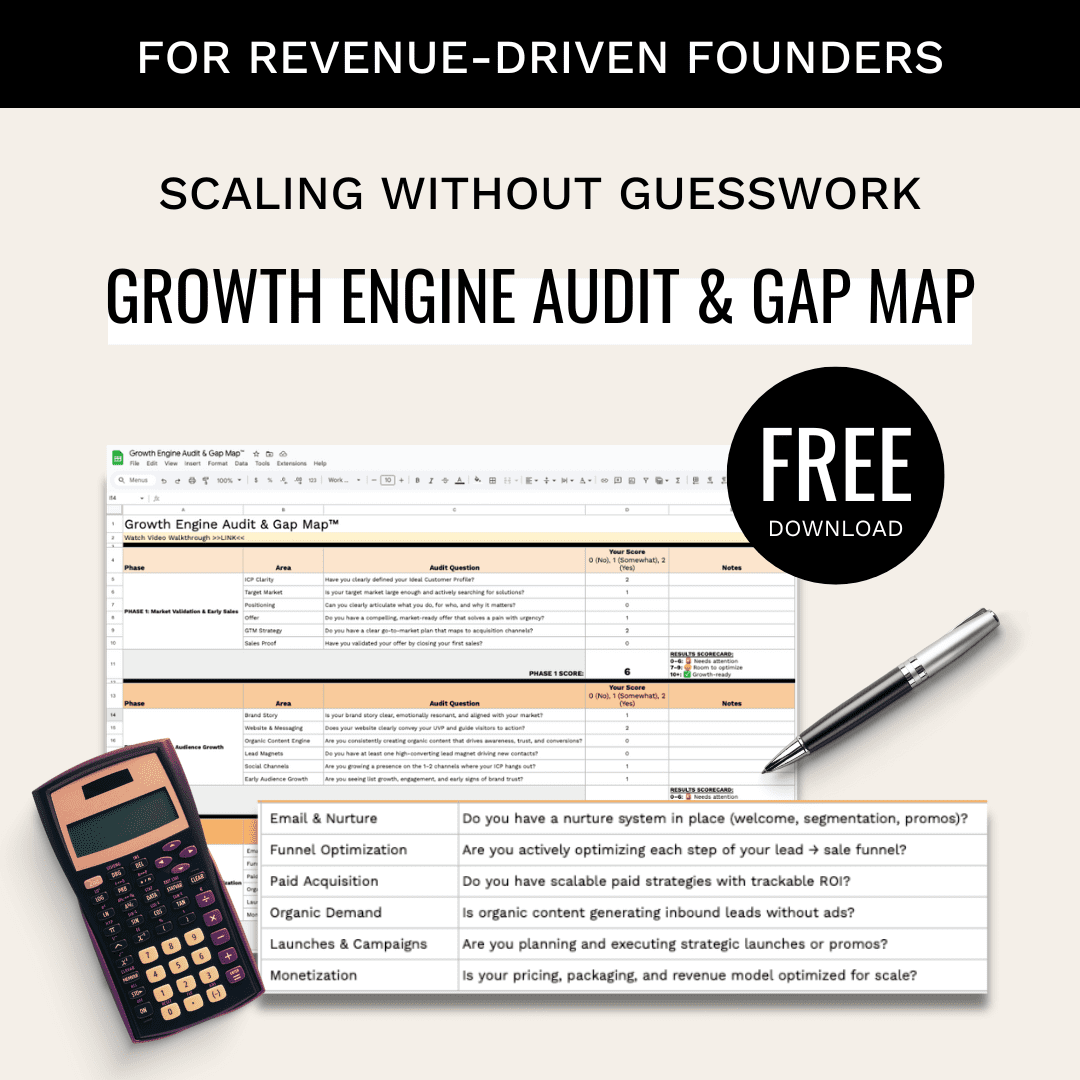AI marketing tools are transforming how businesses grow in 2026. These tools automate tasks, personalize customer experiences, and improve decision-making with data-driven insights. Here are the top 10 AI marketing tools to consider:
- VEED: is an all-in-one online video editing and AI content creation platform designed to help marketers produce high-impact video content without the need for advanced editing skills.
- HubSpot Marketing Hub: Combines AI-powered content creation, CRM integration, and marketing automation.
- Marketo Engage: Focuses on B2B marketing with lead management, email AI, and revenue attribution.
- Drift: Real-time conversational marketing with AI chatbots and lead qualification.
- ActiveCampaign: Enhances email marketing with predictive sending and customer segmentation.
- Clearbit: Enriches customer data for better targeting and lead qualification.
- Hootsuite Insights: Tracks social media trends, sentiment, and brand mentions.
- Seismic: Improves sales enablement with AI-driven content creation and analytics.
- Salesforce Marketing Cloud: Offers personalized customer journeys and advanced campaign management.
- Pathmatics: Provides ad intelligence with competitive insights and creative performance tracking.
These tools help businesses streamline operations, improve ROI, and stay competitive in a fast-evolving digital landscape.
Quick Comparison
| Tool Name | Primary Use Case | Key Features | Best For |
|---|---|---|---|
| VEED | All-in-One AI Video | AI video script generator, text-to-video AI, auto subtitles, AI avatars | Video marketing needs |
| HubSpot Marketing Hub | All-in-One Marketing | AI content, CRM integration, automation | Unified marketing needs |
| Marketo Engage | B2B Marketing Automation | Lead management, email AI, revenue tracking | Enterprise B2B organizations |
| Drift | Conversational Marketing | AI chatbots, lead qualification, real-time chat | Real-time engagement |
| ActiveCampaign | Email Marketing & Automation | Predictive sending, segmentation, campaign automation | Mid-sized businesses |
| Clearbit | Data Enrichment | Lead enrichment, insights, targeting | Data-driven teams |
| Hootsuite Insights | Social Media Analytics | Sentiment analysis, brand monitoring, trend tracking | Social media-focused teams |
| Seismic | Sales Enablement | Content management, analytics, personalization | Enterprise sales teams |
| Salesforce Marketing Cloud | Enterprise Marketing | Journey building, multi-channel campaigns, AI tools | Large organizations |
| Pathmatics | Digital Ad Intelligence | Competitive insights, creative analysis, ad tracking | Advertising teams |
Each tool offers unique features tailored to specific business needs. Choose the one that aligns best with your goals and systems.
Top 10 Best AI MARKETING TOOLS You Need in 2026 to …
Key Features of B2B Tech Marketing Tools
AI has reshaped the way businesses approach marketing, offering features that help tech companies grow and work more efficiently.
Scalable Automation
Look for tools that support automation on a large scale. With AI, small teams can handle tasks that used to require entire departments. Campaigns can be launched in hours rather than weeks, without sacrificing quality [1].
Integration Capabilities
A well-connected marketing stack is crucial. Choose tools that provide:
- Native integrations with popular B2B platforms
- APIs for custom solutions
- Workflow automation between systems
- Real-time data updates
These connections are key to building strong analytics and effective content strategies.
ROI Tracking and Analytics
Analytics features should provide clear insights into performance. Here’s how they help:
| Analytics Feature | Business Impact |
|---|---|
| Campaign Attribution | Identify where revenue comes from |
| Conversion Tracking | Gauge success rates |
| Customer Journey Analytics | Analyze buying behavior |
| Custom Report Building | Share tailored insights with stakeholders |
Content Generation and Optimization
AI has revolutionized content creation. Effective tools should:
- Create content that aligns with your brand voice
- Distribute content effectively across platforms
- Track performance and make real-time adjustments
“Vibe Marketing represents a remarkable shift: one marketer with AI tools can now accomplish what traditionally required 10+ specialists.” – Sonu Kalwar, Author [1]
Personalization Capabilities
Modern tools should excel at personalization by using AI to:
- Analyze buyer behavior
- Recommend tailored content
- Optimize communication timing
- Adjust messages based on engagement
This level of customization not only boosts engagement but also ensures budgets are used wisely.
Cost-Effective Scaling
AI tools allow businesses to grow without requiring a matching increase in spending.
Data Management and Security
For B2B tech companies, secure and reliable data management is non-negotiable. Key features include:
- Safe data storage and processing
- Compliance with industry regulations
- Regular security updates
- Reliable backup and recovery systems
BONUS TOOL: VEED Online Video Editing and AI Content Creation Platform
VEED is an all-in-one online video editing and AI content creation platform designed to help marketers produce high-impact video content without the need for advanced editing skills. With a growing suite of AI tools, VEED makes it easy to generate, repurpose, and optimize videos for every stage of the customer journey.
Key AI Features
| Feature | What It Does | How It Helps Businesses |
| AI Video Script Generator | Creates engaging video scripts based on input prompts | Speeds up ideation and reduces content prep time |
| Text-to-Video AI | Transforms scripts into full video content | Enables faster, scalable video production |
| Auto Subtitles & Translations | Generates accurate subtitles and translates them into 100+ languages | Expands reach and improves accessibility |
| AI Avatar | Adds human-like avatars to narrate your videos | Personalizes videos without hiring talent |
| Magic Cut & Studio Sound | Automatically trims filler words and removes background noise | Polishes videos quickly for a professional finish |
Real-Life Results
Marketers and businesses using VEED have achieved impressive results:
- TheCareerCEO reduced video editing time by 60% using VEED’s AI automation tools.
“VEED has been game-changing. It’s allowed us to create gorgeous content for social promotion and ad units with ease.” – Director of Audience Development, NBCUniversal
AI-Powered Marketing Tools
VEED offers a wide range of AI-driven features tailored for marketers, including:
- Brand templates and auto-resizing for social platforms
- Dubbing AI and avatars for diverse audiences
- Screen recording and webcam integration for tutorials and demos
- Collaboration tools for teams and agencies
Performance Highlights
VEED stands out with:
- Over 3 million monthly users worldwide
- Rated 4.6/5 stars on G2 and Trustpilot
- Saves marketers an average of 8–12 hours per video campaign
What’s Next in 2026
VEED is doubling down on AI innovation with:
- Enhanced voice cloning and avatar personalization
- AI Playground: The latest generative AI models can be tested for video and image creation in one place.
As AI video marketing continues to rise, VEED is positioned as a must-have tool for brands looking to stand out and scale with engaging, high-converting video content.
1. HubSpot Marketing Hub
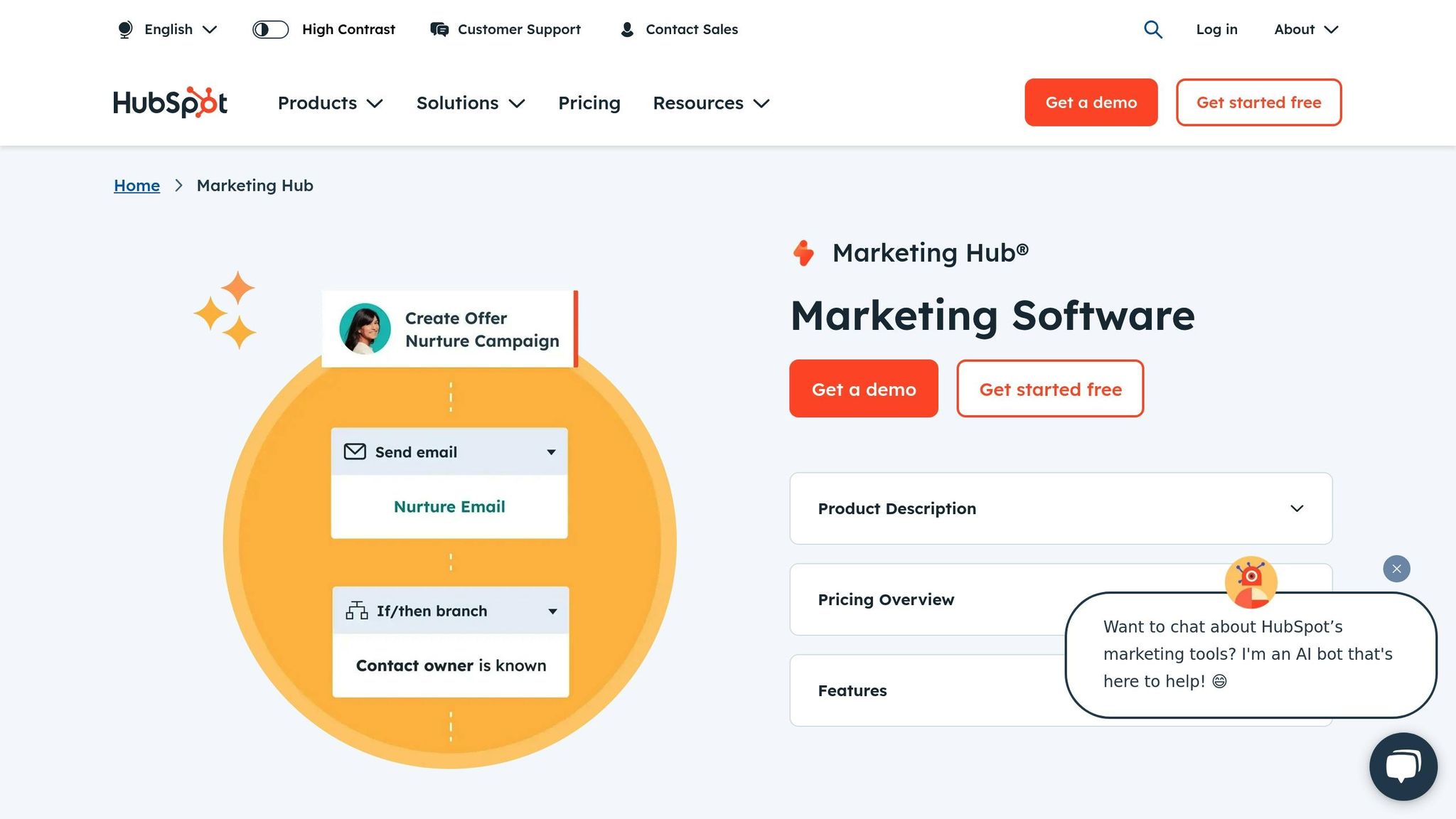
HubSpot Marketing Hub is an AI-powered platform designed to simplify B2B tech marketing operations and deliver measurable results. The 2026 update focuses on AI automation and improved integrations.
Core AI Features
| Feature | Function | Business Impact |
|---|---|---|
| Breeze Copilot | AI-assisted task management | Boosts productivity and streamlines workflows |
| Breeze Agents | Automated content creation and social posting | Cuts manual tasks by 70% |
| Marketing Analytics Suite | AI-driven reporting and attribution | Supports data-backed decision-making |
| Content Remix | Video optimization and publishing | Expands content reach and engagement |
Proven Results
Tech companies have achieved impressive outcomes with the platform:
- PatSnap boosted lead generation by 400%, reached a 33% conversion rate, and shortened sales cycles by 36% [7].
- LogiNext saw a 5x increase in monthly traffic and improved lead qualification by 4x [6].
- Tech Data achieved a 30% email open rate and a 2% click-through rate within just one month [5].
HubSpot’s advanced AI tools are reshaping marketing strategies. Andy Pitre, EVP of Product at HubSpot, explains:
“Until now, we haven’t seen a complete AI solution for businesses… With Breeze, businesses finally get it all. AI that’s agile, intuitive, and embedded, not just with popular LLMs, but your customer data.” [2]
Seamless Integration
The platform connects effortlessly with key tools and platforms, such as:
- YouTube and Instagram Reels for video marketing
- Amplitude for in-depth analytics
- LinkedIn for B2B audience targeting
- Google Suite for managing digital presence
Nicholas Holland, VP of Product at HubSpot, highlights:
“Marketers need a new playbook, built on ease, speed, and unification… The updates we’ve made to Marketing Hub and Content Hub give marketers what they need to build their audiences, create multichannel content, launch campaigns, and measure it all.” [3]
These integrations make HubSpot Marketing Hub an essential part of a cohesive marketing strategy.
Boosting Marketing ROI
The platform’s AI-driven features deliver tangible results:
- 89% of marketers report ROI from AI-generated email content [4].
- Companies using advanced analytics experience a 20% improvement in marketing ROI [4].
- Personalized email campaigns see a 26% increase in open rates [4].
For B2B tech companies, HubSpot Marketing Hub combines AI automation, advanced analytics, and seamless integration to create a unified and impactful marketing strategy in 2026.
2. Marketo Engage
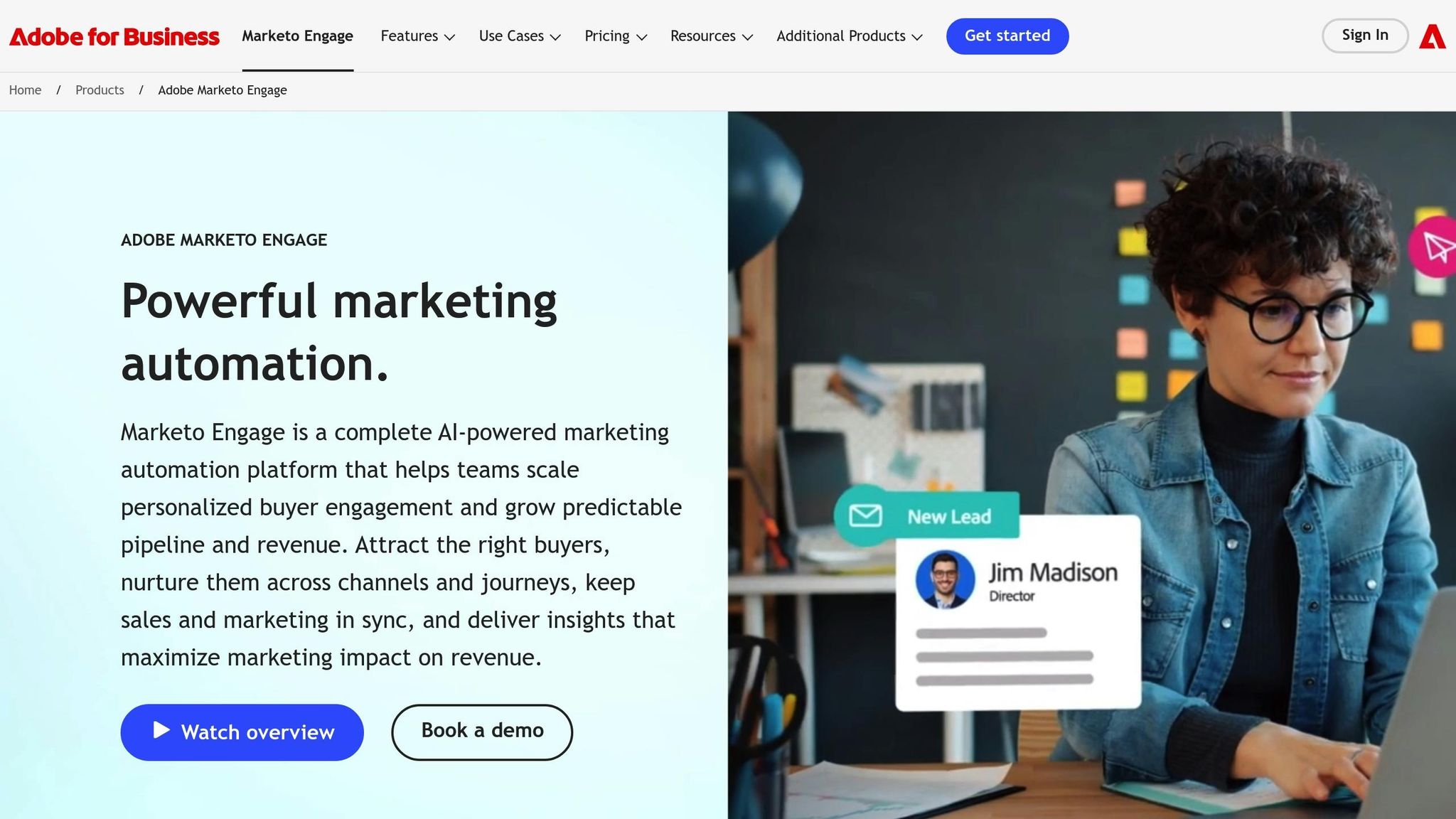
Marketo Engage is an AI-driven marketing automation platform tailored for B2B tech companies in 2026. It uses artificial intelligence to drive revenue and keep buyers engaged.
Key AI Features
| Feature | Function | Benefit |
|---|---|---|
| Dynamic Chat | Provides context-aware replies | Guides customers in real time |
| Journey Builder AI | Optimizes campaign workflows | Refines campaign strategies |
| Email AI | Generates email content | Automates copy and subject lines |
| Webinar Intelligence | Summarizes webinar content | Creates automated FAQs |
| Attribution AI | Analyzes marketing data | Delivers precise performance insights |
Performance Highlights
Marketo Engage has delivered impressive results, including:
- A 37% reduction in the time needed to create email campaigns
- $4 million in additional revenue
- A 2.8x increase in revenue alongside 24x pipeline growth
- 400% lower campaign costs per prospect
- A 40% boost in lead quality and scoring [8]
Seamless Integrations
The platform connects with essential tools in the B2B tech ecosystem, such as:
- CRM platforms like Salesforce, Microsoft Dynamics, and Veeva
- Webinar tools including Zoom and ON24
- Adobe Experience Cloud products
- Synchronization of up to 200,000 records per hour [10]
“Adobe is committed to innovating and reimagining B2B marketing automation and account-based marketing to give B2B marketing teams better ability to create demand for their organization, drive coordination with revenue teams and use data-driven insights to improve every aspect of their programs.” [9]
AI-Powered Marketing Enhancements
Marketo Engage simplifies and improves marketing efforts by:
- Speeding up responses to prospects
- Automating the creation of personalized content
- Managing campaigns across multiple channels
- Strengthening collaboration between sales and marketing teams
“It was very important for us to select marketing software that scaled quickly, could easily integrate with our other systems, and allow all of our marketers to become power users.” [10]
What’s New in 2026
Marketo Engage is introducing cutting-edge updates for 2026, including:
- Generative AI for deeper content personalization
- Advanced tools for marketing data analysis
- Automated optimization of customer journeys
Up next, check out the next tool in our AI marketing suite.
3. Drift
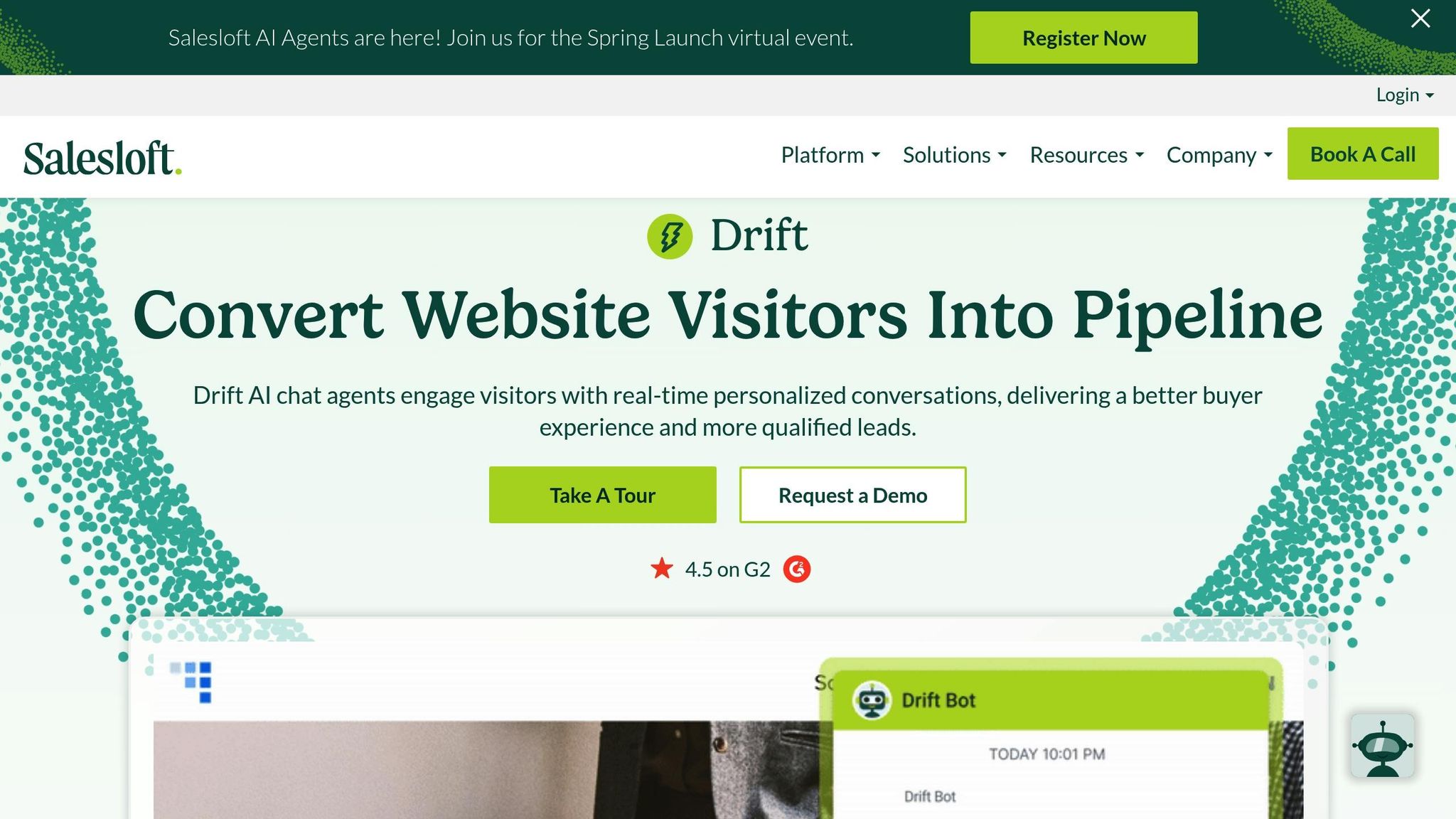
Drift offers a conversational platform designed to transform how B2B tech companies engage with their audience. Using AI-driven tools, it focuses on converting high-intent buyers through real-time, personalized interactions.
Key AI Features
| Feature | Purpose | Business Advantage |
|---|---|---|
| Virtual Selling Assistants | Automates natural, human-like conversations | Qualifies leads instantly |
| Real-time Deanonymization | Identifies website visitors | Enables account-based targeting |
| Fastlane | Syncs with existing tech tools for quicker lead qualification | Speeds up the sales pipeline |
| Rhythm Workflow | Highlights key chat data | Simplifies the sales process |
| ROI Analytics | Tracks performance | Connects actions to revenue growth |
These tools deliver measurable outcomes:
Performance Highlights
- 17.5% annual recurring revenue growth
- 670% return on investment
- 26% boost in demand for personalized experiences
- 64% year-over-year growth in immediate response rates [12][14]
“When our site visitors engage with chat, they now get better, more thorough responses – even though it takes our team less time to set up and manage the [Drift] chatbot.”
- Alla Mosina, Website Product Manager [11]
How Drift Uses AI to Drive Engagement
Drift’s AI capabilities help companies turn engagement into revenue by:
- Automatically qualifying leads using integrated tech tools
- Sending real-time alerts for live sales conversations
- Crafting personalized conversation flows based on user behavior
Practical Use Cases
Drift’s platform delivers results for businesses across industries. Here are a few examples:
- Brandwatch: Uses a “Contact Us” chatbot to connect visitors with a human instantly.
- PTC: Employs persona-specific chatbots to match visitors with the right expert.
- Zenefits: Implements an AI-powered “Website Concierge” to assess visitor needs.
“We’ve seen positive impacts across all stages of the buyer’s journey from Drift, owing to meaningful personalization. We’ve improved website conversion, sourced incremental leads, and accelerated the sales process. Drift is now one of our most-loved martech tools.”
- Steve Measelle, VP of Marketing Global Performance & Strategy [11]
Looking Ahead: Enhancements for 2026
Drift is set to introduce updates that include:
- Advanced AI-driven conversation capabilities
- Stronger integrations with existing tech stacks
- Faster pipeline acceleration
- Better tools for ROI tracking
“We help companies engage in personalized conversations with the right customers at the right time, so they can build trust and grow revenue.”
- Aurelia Solomon, Director of Product Marketing [13]
4. ActiveCampaign
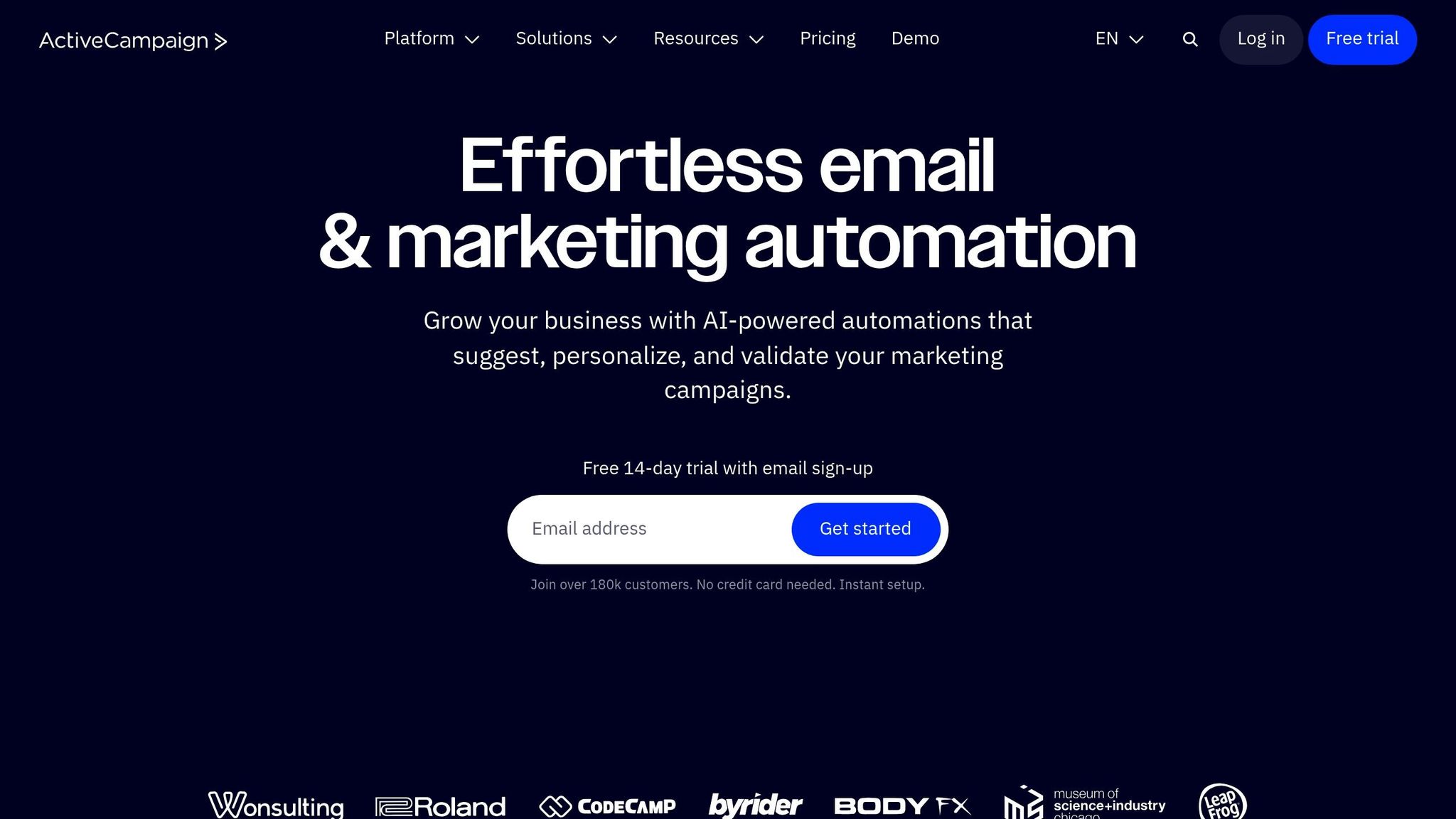
ActiveCampaign is a marketing automation platform that uses AI to help businesses connect with their audiences in smarter ways. By combining automation with personalized experiences, it enables companies to scale their marketing efforts effectively.
Key AI Features
| Feature | What It Does | How It Helps Businesses |
|---|---|---|
| AI-Suggested Segments | Identifies high-value customer groups automatically | Improves targeting precision |
| Predictive Sending | Finds the best times to send emails | Boosts open rates by up to 20% |
| Campaign Co-pilot | Evaluates and enhances campaign performance | Makes ROI tracking easier |
| Generative AI | Produces tailored content | Cuts down time spent on content creation |
| Automation Builder | Creates workflows from simple text commands [20] | Speeds up campaign setup |
Real-Life Results
Here are some standout results from ActiveCampaign clients:
- Artivive: Achieved 47% higher email engagement and grew their community from 100 to 100,000 members [16].
- Motrain: Increased their conversion rate by 120% and saved 15 hours per week [17].
- Soundsnap: Saw a 300% boost in monthly email revenue [18].
“We’re tracking trials started and trial conversions, and right now we’re converting at over 20%. Before ActiveCampaign, we were converting less than 10%.” – Motrain [17]
ActiveCampaign processes over 4 billion experiences every week [19], offering tools like:
- Automation for marketing tasks with over 900 native integrations [15]
- Lead scoring and pipeline management
- Content generation tailored to individual customers
- Multi-channel campaign coordination
Performance Highlights
The platform delivers measurable results:
- Saves 20 hours per month through automation [19]
- Sends over 1 billion emails weekly [19]
- Rated 4.5/5 stars by more than 13,500 users [19]
These results showcase the platform’s impact and pave the way for its future advancements.
“ActiveCampaign is an AI-first, end-to-end marketing platform for people at the heart of the action. It empowers teams to automate their campaigns with AI agents that imagine, activate, and validate – freeing them from step-by-step workflows and unlocking limitless ways to orchestrate their marketing.” – ActiveCampaign, LLC [21]
What’s Next in 2026
ActiveCampaign plans to expand its AI capabilities even further, focusing on:
- Sentiment analysis to gain deeper customer insights
- More tools for AI-generated content
- Enhanced predictive analytics to fine-tune campaign strategies
- Better integration with other marketing technologies
These updates aim to give businesses even more powerful tools for understanding and connecting with their customers.
5. Clearbit
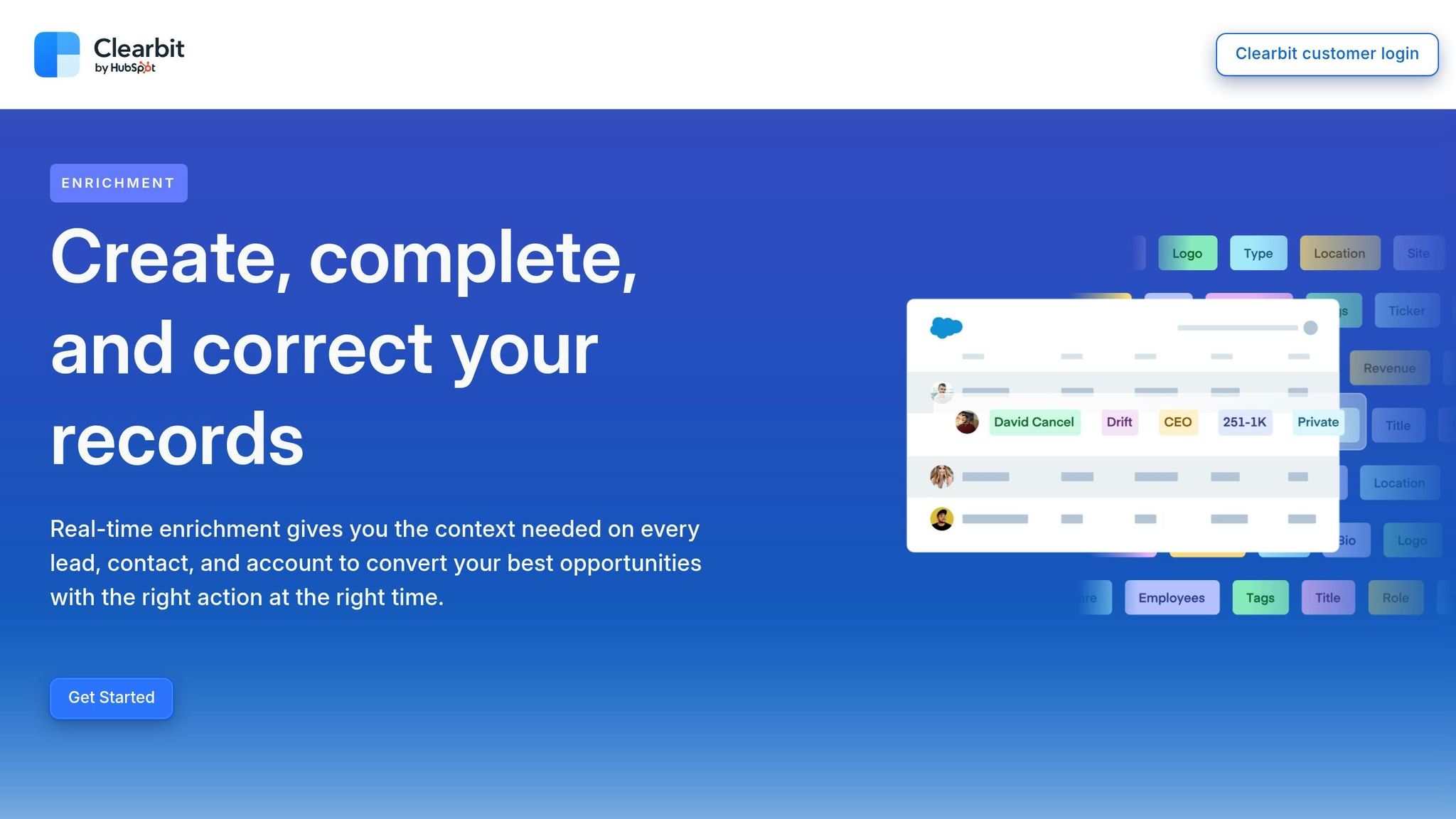
Clearbit uses AI to supercharge B2B data enrichment and customer intelligence. By processing information from over 250 data sources, it delivers detailed insights about companies and potential customers.
Core AI Features
| Feature | Capability | Business Impact |
|---|---|---|
| Real-Time Enrichment | Adds 100+ B2B attributes automatically | Speeds up lead qualification |
| Smart Form Optimization | Simplifies forms to just an email address | Boosts conversion rates |
| Intent Detection | Pinpoints high-intent accounts via IP data | Shortens sales cycles |
| Data Refresh | Updates records every 30 days | Keeps data accurate |
| Global Coverage | Works across all countries and languages | Expands global customer reach |
Success Stories
Clearbit’s impact is clear from its results:
- Gong: Increased demo request conversions by 70% and saw a 5X rise in demo requests since September 2018, thanks to Clearbit’s dynamic enrichment [25].
- Mention: Improved signup conversion rates by 54% using form auto-fill [26].
- Brex: Simplified underwriting by enriching customer data instantly during signup, enabling tailored offers [24].
Comprehensive Data Intelligence
Clearbit’s database includes:
“The level of detail and number of contacts available through Clearbit Prospector was greater than any of the other tools we considered.” – Arvind Ramesh, Intercom [22]
This wealth of data allows for precise audience targeting and smooth integration into marketing workflows.
Top Use Cases for 2026
Clearbit’s data capabilities shine in two key areas:
- Lead Qualification
Clearbit enriches leads with detailed firmographic data, such as:
- Company size and revenue
- Industry classification
- Technology stack
- Corporate hierarchy
- Marketing Automation
The platform supports advanced targeting by:
- Identifying anonymous website visitors
- Detecting buying intent signals
- Standardizing roles and seniority levels
- Enabling account-based marketing strategies
“Clearbit is by far the most flexible data enrichment solution I have come across to date.” – Dexter Hart, Uber [22]
How Companies Use Clearbit
AdRoll showcases Clearbit’s potential by leveraging it for account-based marketing. They enhance their database with detailed firmographic data, enabling precise targeting and personalized campaigns [24]. The platform’s integration with major CRMs ensures growth without sacrificing data quality or targeting accuracy.
sbb-itb-e8c8399
6. Hootsuite Insights (Powered by Talkwalker)

Hootsuite Insights uses advanced AI to elevate social media analytics and monitoring for B2B tech companies. By 2026, it scans conversations across 150 million websites and 30 social media platforms in 187 languages, delivering detailed market insights [27].
AI-Driven Features
| Feature | Capability | Business Impact |
|---|---|---|
| Blue Silk™ AI | Cuts research time by 40% weekly | Faster market insights |
| Sentiment Analysis | Tracks emotions in real time | Better reputation management |
| Image Recognition | Monitors visual content | Improved brand protection |
| Automated Summaries | Generates insights quickly | Streamlined reporting |
| Custom Alerts | Sends real-time notifications | Rapid crisis response |
These features are designed to help tech companies:
- Monitor brand mentions across millions of websites
- Keep tabs on competitor activities in real time
- Spot emerging industry trends
- Understand customer sentiment
- Automate performance reporting
Practical Impact
The tool’s capabilities are already making a difference for users. For example, the University of Sydney’s social media team has seen impressive results. Social Media Manager Liz Grey shares:
“The insights that Talkwalker provides us have been incredible and have really informed our campaign strategy. Providing these insights to our stakeholders demonstrates what social media can do for our brand and helps us secure investment to increase our budgets and grow our team.” [27]
Key Use Cases
Hootsuite Insights is particularly effective in three areas for tech companies:
- Threat Detection: The AI continuously tracks brand mentions and sends alerts about potential issues. This early warning system allows companies to address problems before they escalate [28].
- Customer Insights: By analyzing social conversations, businesses can uncover customer pain points, feature requests, market trends, and insights into their competitive landscape.
- Campaign Improvement: The tool’s analytics identify the best times to post, track engagement, measure performance, and suggest content adjustments to enhance marketing efforts.
Next-Level AI Features
Hootsuite Insights includes cutting-edge tools like:
- Video recognition technology
- AI conversation grouping
- Custom AI classifiers
- Real-time sentiment tracking
The platform monitors social networks, news outlets, forums, and even podcasts. Its expansive coverage and AI-powered analysis help tech companies stay on top of relevant conversations and make quick, informed marketing decisions.
7. Seismic
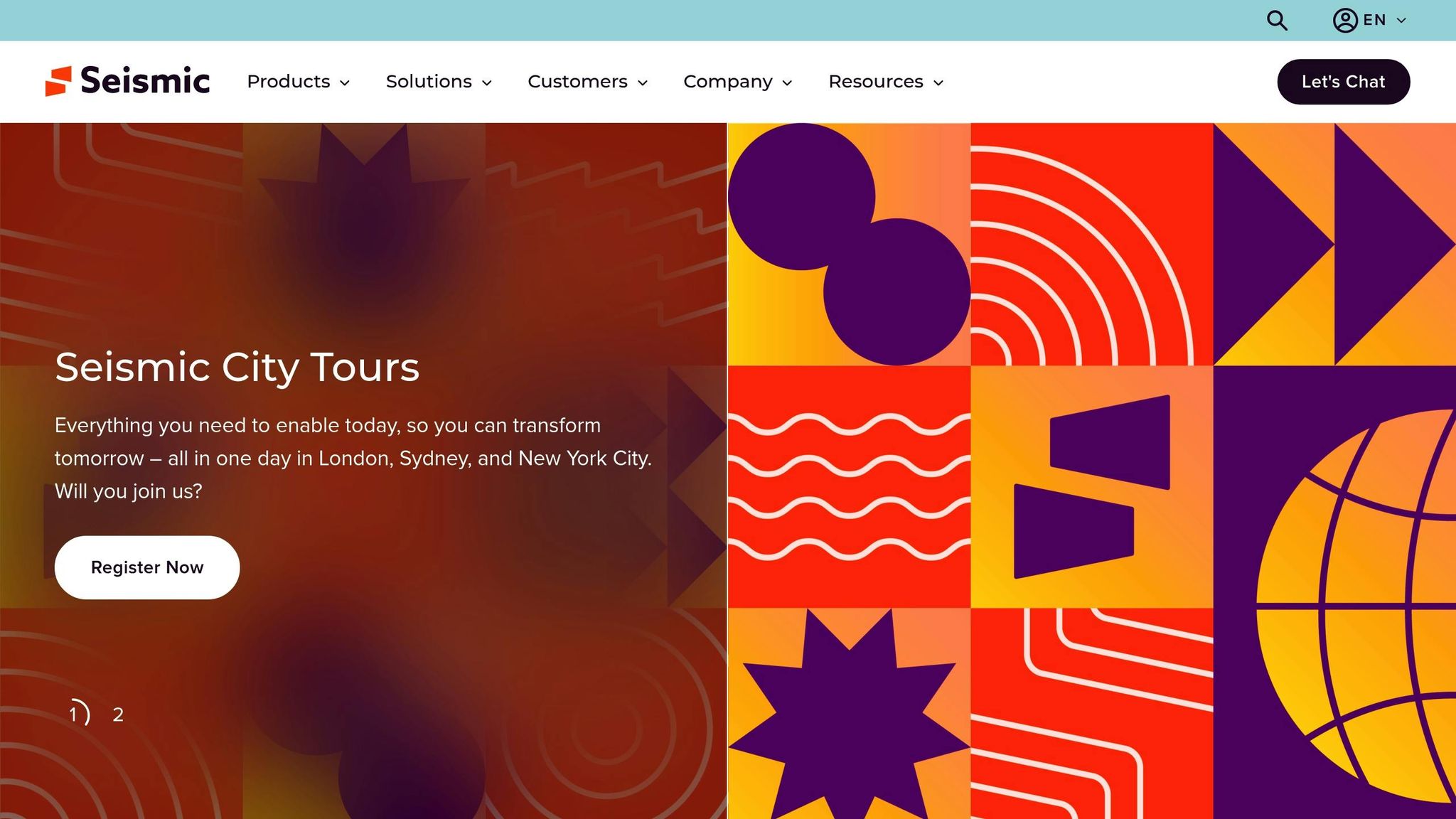
Seismic is an AI-powered platform designed to improve sales content for B2B tech companies. It combines automation and predictive insights to make sales enablement more efficient and effective.
Key AI Features
| Feature | Function | Business Impact |
|---|---|---|
| Seismic Aura Copilot | Creates and automates content using AI | Speeds up content creation |
| LiveDocs | Personalizes content dynamically | Scales content across different markets |
| Smart Search | Helps reps find content quickly with AI | Saves over 100 hours per year per rep |
| Intelligent Analytics | Tracks engagement and provides insights | Boosts pipeline growth by 32% |
| Automated Coaching | Delivers tailored sales training | Increases new rep revenue by 65% |
These tools deliver measurable results. Companies using Seismic report doubled content usage, 76 million pieces of content shared, 5.7 million personalized LiveDocs, and 1.3 million Digital Sales Rooms.
Real-World Example
Blackbaud’s experience shows how Seismic can transform operations. Alan Yarborough, Senior Brand Enablement Manager at Blackbaud, shared:
“With Seismic we’ve seen this breakdown of silos, increased communication between sales, marketing, and sales enablement. Through that we’re able to increase pipeline, increase our win rate, and close our deals faster.” [30]
AI-Driven Roadmap
Seismic’s plans for 2026 focus on four key areas:
- Discover: Smarter content recommendations and search
- Create: AI tools for content generation and improvement
- Automate: Simplified workflows and automation
- Advise: Insights and coaching powered by data
As Seismic explains:
“Enablement is a mission-critical function that turns company strategy into reality, and we believe generative AI has created an industry-defining moment for GTM and enablement teams. It will change everything about the sales process, from prospecting to meeting preparation, content and presentation development, follow-up, training and performance tracking.” [29]
Seamless Integrations
Seismic integrates with over 150 CRM systems, including Salesforce and Microsoft Dynamics. Oracle, for example, adopted Seismic to support its “One Oracle” strategy, improving efficiency and ensuring consistent messaging worldwide.
According to industry data, 91% of enablement tech users report faster adaptability and speed to market, while 94% see improved go-to-market efficiency. These stats highlight Seismic’s role in driving growth for B2B tech companies.
8. Salesforce Marketing Cloud
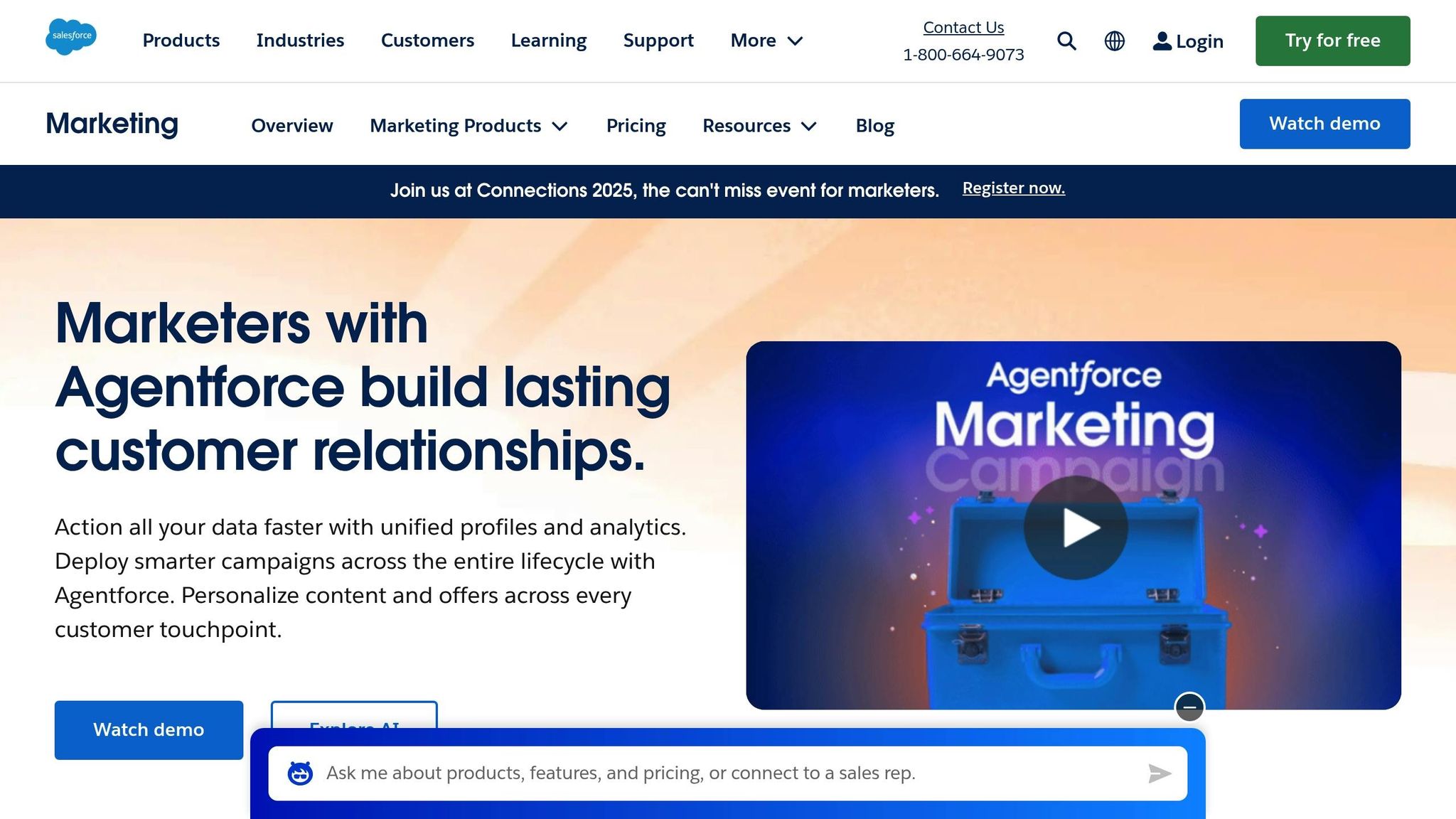
Salesforce Marketing Cloud is an AI-powered platform designed to transform B2B marketing. Its 2026 version focuses on delivering personalized customer experiences while boosting ROI through intelligent automation.
AI-Powered Campaign Management
| Feature | Capability | Impact |
|---|---|---|
| Agentforce Campaign Designer | Automates campaign creation and optimization | Cuts campaign creation time by 60% |
| Einstein Lead Scoring | Predicts lead conversion potential | Increases customer engagement by 32% |
| Multi-Touch Attribution | Tracks channel performance with AI | Boosts marketing ROI by 32% |
| WhatsApp Integration | Improves global customer connections | Raises customer lifetime value by 34% |
| Blockout Windows | Controls message timing intelligently | Lowers acquisition costs by 27% |
These features help businesses achieve measurable outcomes, as demonstrated by real-world case studies.
Real-World Success Story
Boston Scientific enhanced customer engagement by centralizing their data to create tailored journeys for healthcare professionals. Denis Scott, VP of Growth Marketing at Momentive, highlights the platform’s value:
“You can’t truly have a focus on the customer journey without a single source of truth for your data, and that is what Salesforce Marketing Cloud gives to us. Having all our data in one place means we can create smarter automations and rules to help us tailor our messages to what the customer wants and needs, ensuring they hear only the best, most relevant information.” [32]
Proven Business Results
Research from Forrester [31] shows businesses using Salesforce Marketing Cloud achieve:
- 299% ROI over three years
- Over $5 million in additional revenue
- 90% improvement in email deliverability
- 10% higher conversion rates
AI-Driven Features
The platform’s Agentforce technology includes:
- Automated brief generation and targeting
- AI-powered content creation
- Smart customer journey mapping
- Real-time content delivery
- Autonomous ad optimization
Michael Kostow, EVP & GM of Marketing Cloud at Salesforce, explains the importance of these advancements:
“Brands that have accelerated success during the pandemic are data-focused, embrace AI, prioritize privacy, and find agile ways to collaborate across their entire organization.” [32]
Seamless Integration
Integration with Data Cloud and CRM systems brings all customer data into one place. This is essential, given that 78% of marketers view data as key to customer engagement, and 84% report rising customer expectations [32]. These integrations, combined with AI-powered tools, make Salesforce Marketing Cloud a cornerstone for modern B2B marketing strategies.
9. Pathmatics
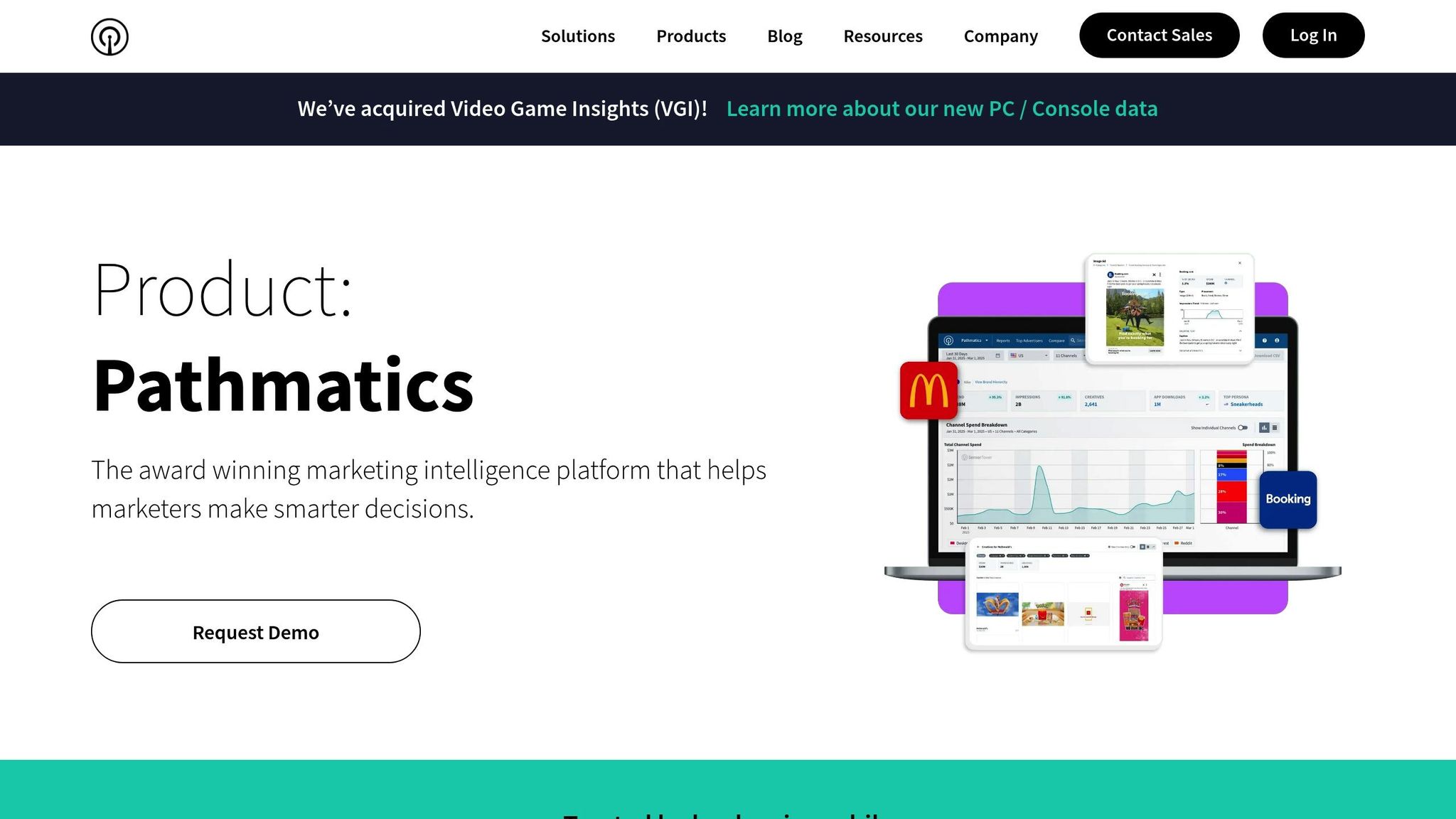
Pathmatics is a marketing intelligence platform designed to bring clarity to digital advertising in 2026. Its AI-powered tools help B2B tech companies make informed decisions and fine-tune their marketing efforts.
Key Features
| Feature | What It Does | How It Helps |
|---|---|---|
| Cross-Platform Analytics | Tracks ads across platforms like Facebook, Instagram, YouTube, Snapchat, Pinterest, and Reddit | Offers a clear view of the market |
| Historical Analysis | Examines trends and past performance data | Improves strategic planning |
| Creative Intelligence | Analyzes top-performing ad content with AI | Refines messaging for better results |
| Competitive Insights | Compares competitor strategies side by side | Helps gain a competitive edge |
| Share of Voice Tracking | Monitors brand visibility in real time | Justifies marketing budgets effectively |
In-Depth Market Analysis
Pathmatics provides detailed insights into advertisers and publishers, helping businesses spot growth opportunities and make the most of their marketing budgets. These insights pave the way for better creative strategies.
Creative Performance Metrics
Pathmatics tracks and evaluates key creative elements, such as:
- Ad performance metrics
- Audience targeting success
- Effectiveness of calls-to-action
- Placement efficiency
- Detection of language used in creative content
Supporting Strategic Decisions
The platform goes beyond analytics, helping businesses craft strategies based on data. Here’s how it drives smarter planning:
| Strategy Area | Insights Provided |
|---|---|
| Media Planning | Identifies seasonal trends and the best times to advertise |
| Budget Allocation | Pinpoints which channels perform best |
| Competitive Analysis | Tracks share of voice and ranks competitors |
| Campaign Optimization | Evaluates creative effectiveness and audience engagement |
| Market Entry | Validates strategies for entering new markets |
A senior marketing executive shared their perspective:
“Pathmatics is a game-changer in the realm of advertising intelligence. Its ability to provide valuable insights and competitive advantages through data analysis is unparalleled.” [33]
Practical Applications
Pathmatics equips marketers with tools to better understand their audience, refine ad strategies, and outpace competitors in the ever-evolving digital landscape.
Tool Comparison Chart
Here’s a streamlined comparison of top AI marketing tools for 2026, highlighting their main uses, standout features, and ideal users.
| Tool Name | Primary Use Case | Key Features | Best For |
|---|---|---|---|
| HubSpot Marketing Hub | All-in-One Marketing | – AI content assistant – CRM integration – Marketing automation |
Companies needing a unified marketing platform |
| Marketo Engage | B2B Marketing Automation | – Lead management – Account-based marketing – Revenue attribution |
Enterprise B2B organizations |
| Drift | Conversational Marketing | – AI chatbots – Lead qualification – Meeting scheduling |
Companies focused on real-time engagement |
| ActiveCampaign | Email Marketing & Automation | – Customer segmentation – Predictive sending – Campaign automation |
Mid-sized businesses |
| Clearbit | Data Enrichment | – Lead enrichment – Company insights – Prospect targeting |
Data-driven marketing teams |
| Hootsuite Insights | Social Media Analytics | – Brand monitoring – Sentiment analysis – Trend tracking |
Social media-focused teams |
| Seismic | Sales Enablement | – Content management – Analytics – Personalization |
Enterprise sales teams |
| Salesforce Marketing Cloud | Enterprise Marketing | – Journey building – Cross-channel marketing – Einstein AI integration |
Large organizations |
| Pathmatics | Digital Ad Intelligence | – Creative analysis – Competitive insights – Market tracking |
Digital advertising teams |
This table outlines each tool’s main strengths, making it easier to find the right fit for your business. Now, let’s dive into how these tools integrate with your existing systems.
Integration Capabilities
AI tools are evolving quickly, with frequent updates improving how they connect with other platforms and enhance overall performance.
Feature Comparison Matrix
Below is a matrix comparing essential features across three pricing tiers, helping you evaluate tools based on your budget and needs:
| Feature Category | Basic Tools<br>($0-$100/mo) | Mid-Range Tools<br>($100-$1000/mo) | Enterprise Tools<br>($1000+/mo) |
|---|---|---|---|
| AI Capabilities | Content suggestions, Basic automation | Advanced analytics, Predictive insights | Custom AI models, Full automation |
| Integration Options | Limited third-party connections | Moderate ecosystem | Extensive enterprise integration |
| Customization | Template-based | Moderate customization | Full customization |
| Support Level | Email, Knowledge base | Priority support, Training | Dedicated support, Custom training |
| Scalability | Limited users/features | Team collaboration | Enterprise-wide deployment |
Use this guide to pinpoint the tool that matches your organization’s specific requirements and growth plans.
How to Pick Your Marketing Tool
Choosing the right AI marketing tool means aligning it with your needs, resources, and growth objectives. Here’s a framework to help guide your decision.
Assess Your Marketing Setup
Start by reviewing your current marketing tools and processes. Identify areas where AI could improve performance or fill gaps.
Define Your Key Requirements
Budget Considerations
Make sure the tool fits within your budget without compromising essential features.
Technical Compatibility
Ensure the tool integrates seamlessly with your existing systems. Here’s a quick reference:
| System Type | Priority | Impact |
|---|---|---|
| CRM | High | Must sync customer data and interactions |
| Analytics | High | Should provide unified reporting |
| Email Platform | Medium | Needs to work with your current email system |
| Content Management | Medium | Should streamline content workflows |
| Social Media | Low | Optional, depending on your strategy |
Once you’ve defined these requirements, plan your implementation to get the most out of the tool.
Evaluate What’s Needed for Implementation
AI marketing tools can deliver 10–20% cost savings and efficiency gains [34]. To achieve this, consider the following:
- Team Readiness
Train your team to use the tool effectively and integrate it into their workflows. - Data Quality
Keep your customer data clean and organized. Strong marketing analytics and clear data governance policies are essential. - Scalability
Pick a tool that can grow with your business. It should handle increasing campaign demands and work well with your current systems.
Test Before Committing
Before rolling out the tool across your organization, test it. Use free trials or pilot programs to evaluate its performance. Monitor key metrics and gather team feedback to ensure it meets your needs.
Focus on Long-term Benefits
Think beyond upfront costs. Tools with predictive analytics can increase marketing ROI by 20% [34]. Prioritize long-term value over short-term savings.
Ensure Security and Compliance
Make sure the tool adheres to industry standards for:
- Data privacy regulations
- Security protocols
- Compliance requirements
- User permission controls
With 73% of companies now using generative AI [35], it’s crucial to select a tool that not only addresses your current needs but also positions you for future success.
Conclusion
The future of B2B tech marketing is already unfolding, driven by advancements in AI tools. By 2026, AI is expected to offer B2B tech companies new ways to achieve growth and improve ROI. Companies that are fully embracing AI are seeing impressive results, with those at the highest levels of AI adoption growing 4.7x faster year over year compared to their peers with lower adoption rates [37].
AI is transforming how marketing operates, taking over data-driven tasks while allowing marketers to focus on maintaining brand identity. This shift has led to:
- Faster launch cycles, reduced from weeks to just hours
- Smaller, agile teams delivering more impact with tighter budgets
- Smarter decisions driven by automated AI tools
These changes are reshaping how marketing strategies are executed. For example, Spotify’s “AI DJ” initiative boosted weekly user engagement by 40% and increased session times by 30%, all thanks to AI-powered personalization [1].
To succeed in this evolving landscape, it’s important to:
- Align AI efforts with business goals while keeping your brand genuine
- Invest in your team’s skills, as 80% of executives are looking for AI-savvy talent [36]
- Leverage AI to outperform competitors, with companies already seeing 15% higher top-line performance – expected to double by 2026 [37]
“Remember how VIBE CODING (replit, bolt, lovable) transformed 8-week development cycles into 2-day sprints? The same 20x acceleration is hitting marketing teams RIGHT NOW.” – GREG ISENBERG [36]
FAQs
How do AI marketing tools improve personalized customer experiences?
AI marketing tools use advanced data analysis to create highly personalized customer experiences by examining factors like browsing habits, purchase history, and user preferences. This allows businesses to deliver tailored product recommendations, customized content, and targeted offers that resonate with individual customers.
These tools also adapt in real time, adjusting interactions based on customer behavior to enhance engagement, boost satisfaction, and foster loyalty. By leveraging AI, companies can create meaningful connections that drive conversions and long-term retention.
What should I consider when integrating AI marketing tools into my current systems?
When integrating AI marketing tools into your existing systems, it’s important to start by evaluating your current marketing setup. Take stock of the tools you already use, assess their compatibility with AI solutions, and identify specific areas where AI can add value, such as customer segmentation, predictive analytics, or content personalization.
Next, choose AI tools that align with your business goals and ensure they can be seamlessly integrated into your workflows. Proper planning, team training, and attention to compliance and ethical considerations are essential for a smooth transition. Finally, set clear metrics to measure the success of the integration and adjust your strategies as needed to maximize results.
How can businesses evaluate the ROI of using AI marketing tools?
To evaluate the ROI of AI marketing tools, businesses should focus on three key areas:
- Measurable ROI: Analyze tangible outcomes like increased revenue, improved operational efficiency, or reduced risks to determine the direct financial impact.
- Strategic ROI: Assess how AI supports long-term goals, such as enhancing customer experience or expanding market share, by aligning tools with your business strategy.
- Capability ROI: Consider the value of strengthening your organization’s AI infrastructure, which can drive future innovation and digital transformation.
Additionally, leveraging AI-powered methods like first-party data analysis, advanced marketing mix modeling, and data-driven attribution can help refine measurement strategies and maximize returns.
Related Blog Posts
- AI Agents in Marketing: The Secret to Driving 10x Engagement & Conversions
- 5 Ways AI Can Optimize Marketing ROI for your Tech Startup
- 10 Best Marketing Tools for Startups in 2026
- AI Growth Marketing: Forecasting Use Cases
